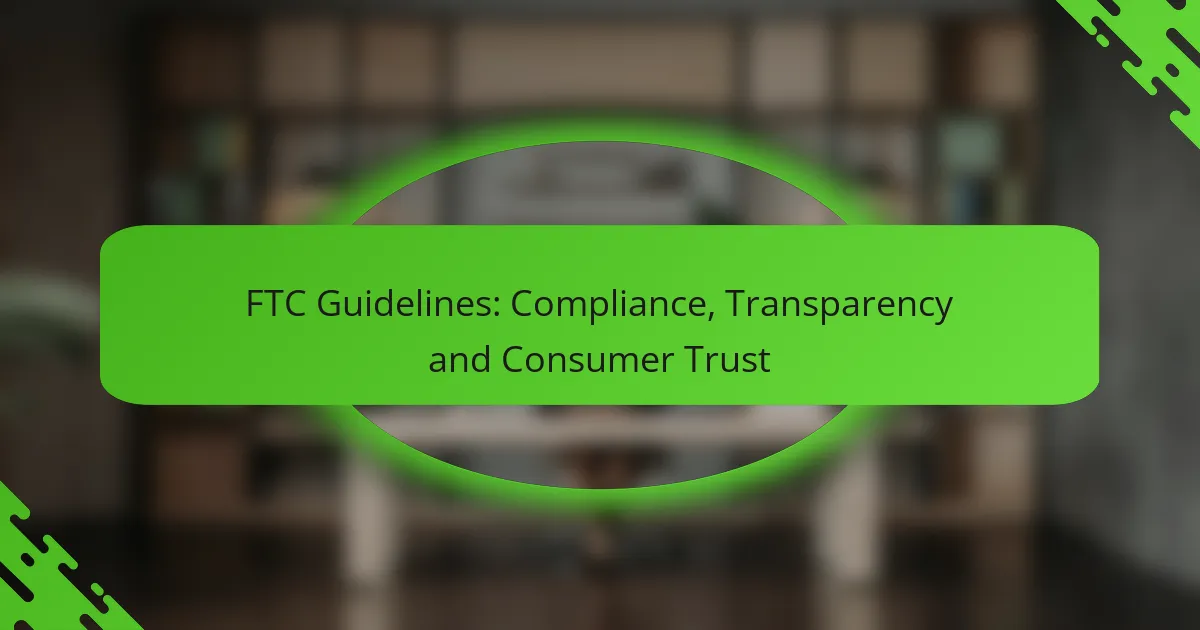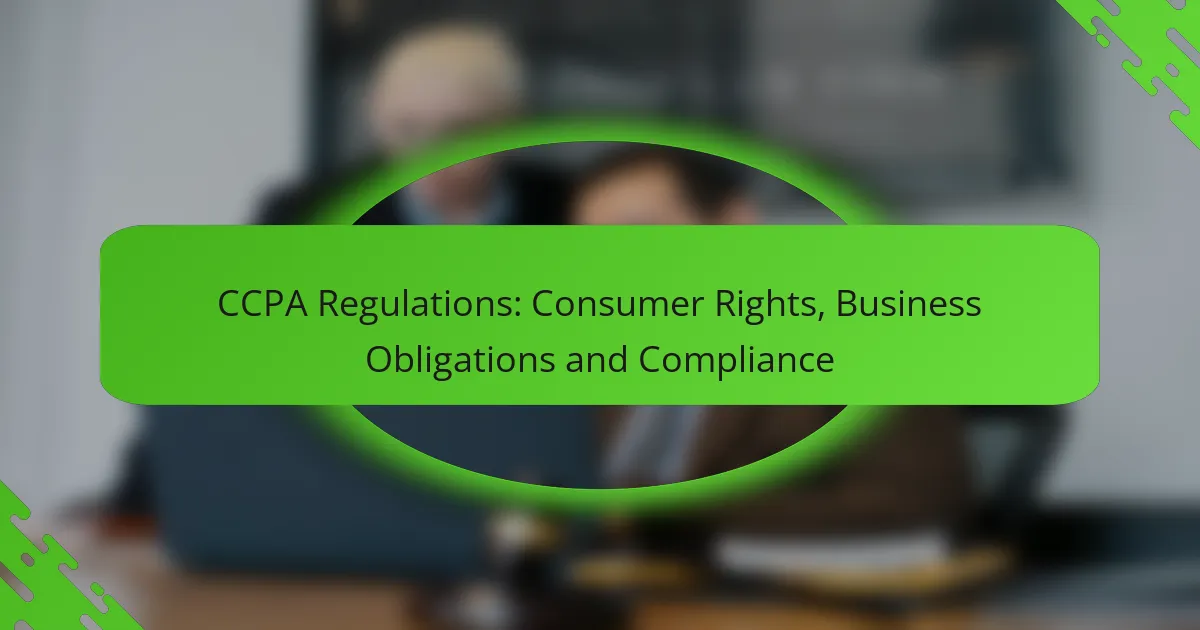Understanding and adhering to FTC guidelines is essential for businesses aiming to maintain compliance and foster consumer trust. By ensuring transparency in advertising and providing clear disclosures about sponsored content, companies can avoid legal pitfalls while promoting informed decision-making among consumers. These guidelines emphasize the importance of truthful communication, which ultimately enhances accountability and consumer confidence in the marketplace.
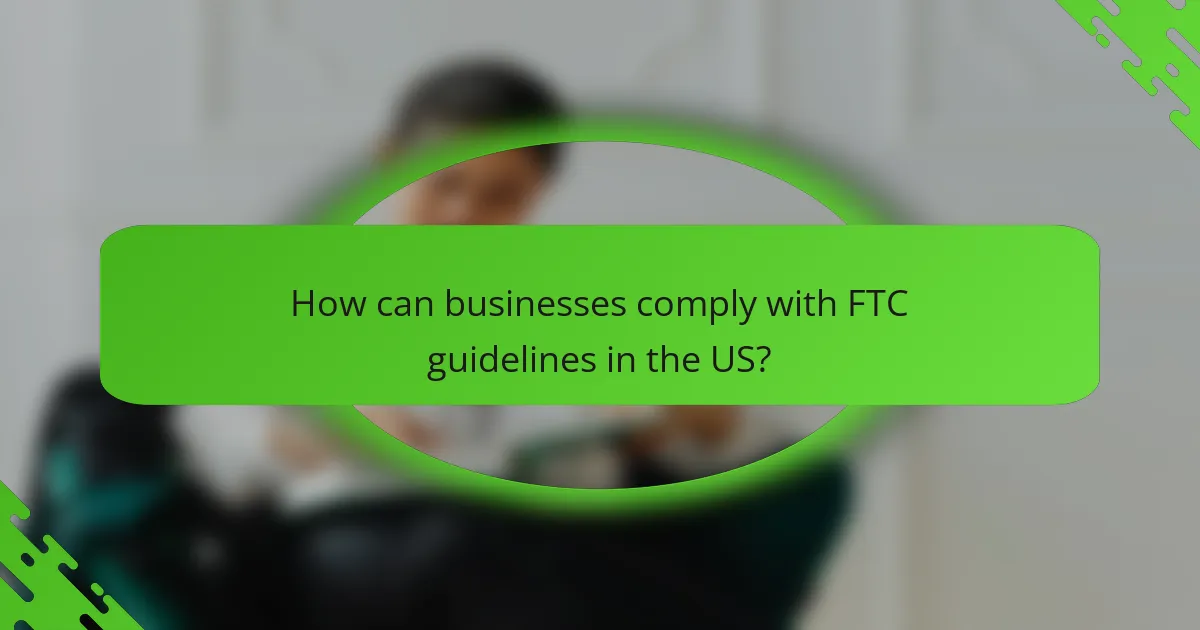
How can businesses comply with FTC guidelines in the US?
Businesses can comply with FTC guidelines by ensuring transparency in their advertising practices and providing clear disclosures about sponsored content. This fosters consumer trust and helps avoid potential legal issues.
Clear disclosure of sponsored content
Clear disclosure of sponsored content is essential for compliance with FTC guidelines. Businesses must inform consumers when content is paid for or sponsored, using straightforward language such as “paid advertisement” or “sponsored post.” This transparency helps consumers make informed decisions.
Disclosures should be placed prominently, ideally at the beginning of the content, and should be easily understandable. For instance, using bold text or distinct colors can enhance visibility and clarity.
Regular training for marketing teams
Regular training for marketing teams is crucial to ensure that all members understand FTC guidelines and their implications. Training sessions should cover the importance of compliance, the specifics of required disclosures, and the potential consequences of non-compliance.
Consider implementing quarterly workshops or online courses that include case studies and practical examples. This approach keeps the team updated on best practices and reinforces the importance of ethical marketing.
Utilizing compliance checklists
Utilizing compliance checklists can streamline the process of adhering to FTC guidelines. A checklist can help businesses ensure that all necessary disclosures are included in their marketing materials before publication.
Key items to include in a compliance checklist might be: verifying the clarity of disclosures, ensuring proper placement, and confirming that all team members are aware of the guidelines. Regularly updating the checklist based on new regulations or feedback can enhance its effectiveness.
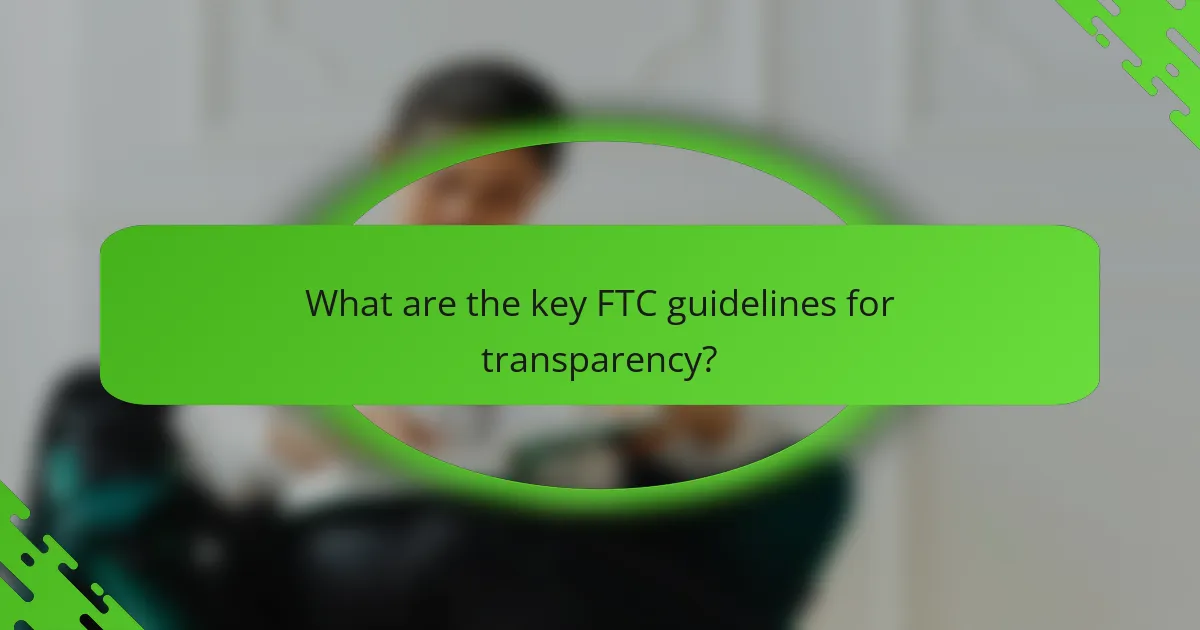
What are the key FTC guidelines for transparency?
The key FTC guidelines for transparency focus on ensuring that advertising is truthful and not misleading, allowing consumers to make informed decisions. These guidelines emphasize clear communication about products and services, especially regarding endorsements and testimonials.
Truth in advertising
Truth in advertising requires that all claims made about a product or service must be accurate and substantiated. Advertisers should avoid misleading statements and ensure that any claims can be backed by evidence. For instance, if a product claims to reduce energy consumption, the advertiser must have data to support this assertion.
To comply with these guidelines, businesses should conduct thorough research before making claims and be prepared to provide documentation if challenged. A common pitfall is exaggerating benefits, which can lead to consumer distrust and potential legal action.
Endorsement and testimonial guidelines
The endorsement and testimonial guidelines stipulate that any endorsements must reflect the honest opinions, findings, beliefs, or experiences of the endorser. If there are any material connections between the endorser and the advertiser, such as payment or free products, these must be disclosed to the audience.
For example, if a social media influencer is paid to promote a skincare product, they must clearly indicate this relationship in their posts. Failure to disclose such connections can mislead consumers and violate FTC regulations. Businesses should train endorsers on these requirements to maintain compliance and foster consumer trust.
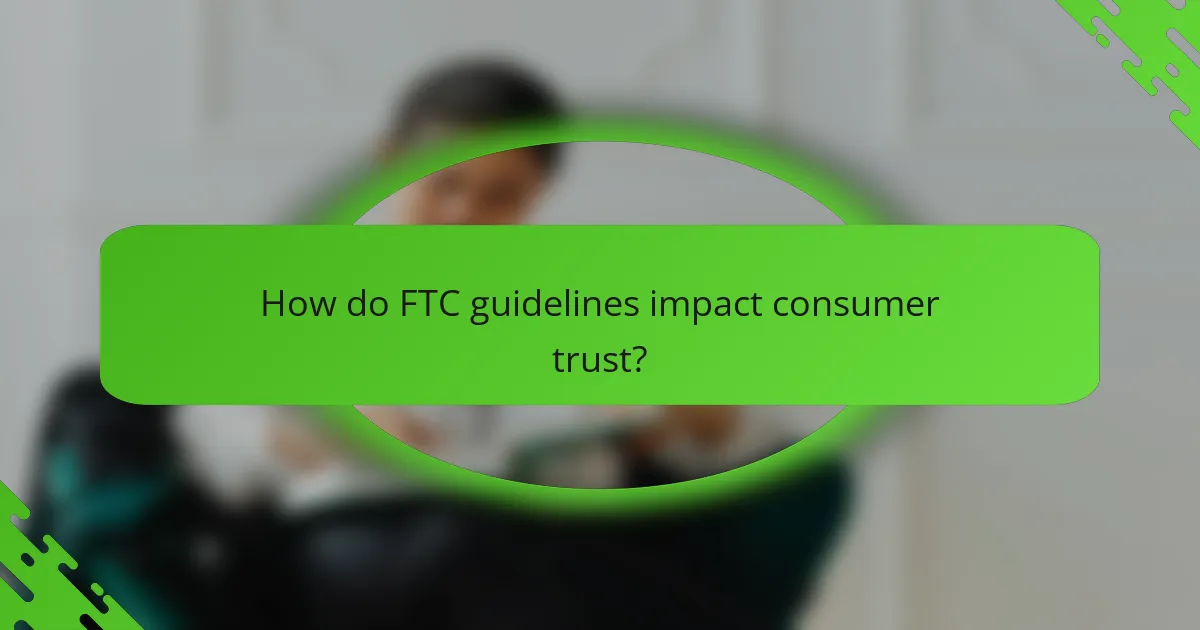
How do FTC guidelines impact consumer trust?
FTC guidelines significantly enhance consumer trust by promoting transparency and accountability in marketing practices. When companies adhere to these regulations, consumers feel more secure in their purchasing decisions, knowing that they are protected from deceptive advertising.
Increased consumer confidence
When businesses comply with FTC guidelines, they demonstrate a commitment to honest communication, which fosters increased consumer confidence. Clear labeling, truthful advertising, and transparent data practices assure consumers that they are making informed choices.
For example, companies that disclose material connections with influencers or provide clear terms for promotions are more likely to earn consumer trust. This trust can lead to higher customer loyalty and repeat business.
Reduction in misleading practices
FTC guidelines help reduce misleading practices by setting clear standards for advertising and marketing. These regulations require that claims made in advertisements are substantiated and not deceptive, which protects consumers from false information.
Businesses that follow these guidelines are less likely to engage in practices like false advertising or hidden fees, which can erode trust. By ensuring that marketing messages are accurate and transparent, companies can build a more trustworthy relationship with their customers.

What are the consequences of non-compliance?
Non-compliance with FTC guidelines can lead to significant repercussions for businesses, including financial penalties and legal challenges. Companies must prioritize adherence to these regulations to maintain consumer trust and avoid costly consequences.
Fines and penalties
The FTC can impose substantial fines on businesses that fail to comply with its guidelines. These fines can range from thousands to millions of dollars, depending on the severity of the violation and the company’s revenue. For instance, companies may face penalties for misleading advertising or failing to disclose material information.
In addition to direct fines, businesses may incur additional costs related to compliance efforts and potential remediation. It’s essential to assess and implement compliance measures proactively to minimize financial risks.
Legal action and lawsuits
Non-compliance can also lead to legal actions, including lawsuits from consumers or competitors. Affected parties may seek damages for deceptive practices, which can result in costly settlements or judgments against the company. Legal fees can quickly accumulate, adding to the financial burden.
Moreover, a history of non-compliance can damage a company’s reputation, making it more vulnerable to future lawsuits. Businesses should regularly review their practices and ensure transparency to mitigate these risks and protect their brand integrity.

How can companies ensure ongoing compliance?
Companies can ensure ongoing compliance with FTC guidelines by implementing systematic practices that promote transparency and accountability in advertising. This involves regular evaluations of marketing strategies and staying informed about regulatory updates.
Regular audits of advertising practices
Conducting regular audits of advertising practices helps companies identify potential compliance issues before they escalate. These audits should assess the accuracy of claims, the clarity of disclosures, and the overall alignment with FTC standards.
To effectively perform these audits, businesses can establish a checklist that includes key elements such as claim substantiation, proper use of endorsements, and adherence to disclosure requirements. Regular audits can be scheduled quarterly or biannually, depending on the scale of the advertising efforts.
Staying updated with FTC changes
Staying informed about changes in FTC regulations is crucial for maintaining compliance. Companies should monitor the FTC’s website and subscribe to relevant newsletters or updates to receive timely information on new guidelines and enforcement actions.
Additionally, attending industry conferences or workshops can provide insights into best practices and emerging trends in compliance. Engaging with legal experts or compliance consultants can also help businesses navigate complex regulatory landscapes effectively.

What tools can assist with FTC compliance?
Several tools can aid businesses in achieving compliance with FTC guidelines, enhancing transparency and building consumer trust. These tools include compliance management software and legal consultation services, each offering unique benefits to help navigate regulatory requirements.
Compliance management software
Compliance management software streamlines the process of adhering to FTC regulations by automating documentation, tracking compliance activities, and generating reports. This software often includes features like risk assessment tools and audit trails, which help businesses identify and mitigate potential compliance issues.
When selecting compliance management software, consider factors such as user-friendliness, integration capabilities with existing systems, and customer support. Popular options include tools like ComplyAdvantage and LogicGate, which cater to various business sizes and sectors.
Legal consultation services
Legal consultation services provide expert guidance on FTC compliance, helping businesses understand their obligations and avoid pitfalls. These services can include reviewing marketing materials, advising on data privacy practices, and ensuring that advertising claims are substantiated.
Engaging with legal experts can be particularly beneficial when launching new products or campaigns. Look for attorneys or firms specializing in consumer protection laws and FTC regulations to ensure that your business remains compliant and minimizes legal risks.






